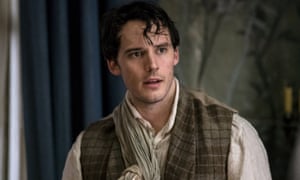My Cousin Rachel review – fateful attraction
Rachel Weisz is captivating as the enigmatic heroine in a Daphne du Maurier adaptation that adds modern psychology to the period drama
Mark Kermode, Observer film critic
Sunday 11 June 2017 09.00 BST
“D
id she? Didn’t she? Who’s to blame?” When 20th Century Fox first brought Daphne du Maurier’s slippery 1951 novel to the screen a mere year after its publication, its overheated publicity promised that Olivia de Havilland was “the only star in the world” who could portray its titular heroine, a mysterious beauty who left bewildered men wondering: “Was she woman or witch, Madonna or murderess?!”
Now, Rachel Weisz gives De Havilland a run for her money in a new screen version of Du Maurier’s twisty tale. It’s written and directed with pastiche-inflected panache by Roger Michell, whose diverse CV ranges from the romcom Notting Hill to the psychodrama Enduring Love via the provocative The Mother. Pitting Weisz’s captivating 19th-century widow against Sam Claflin’s baby-faced man-boy Philip Ashley (a role that previously made a star of Richard Burton), this saucily subversive dark romance mixes old-fashioned costumed intrigue with lustily modern psychological twists and post-Freudian thrills.
When his wealthy adoptive cousin Ambrose Ashley falls under the spell of Weisz’s “radiant and good” Rachel while taking the sun in Florence, orphan Philip suspects foul play. Responding too late to Ambrose’s instructions to “come quick!”, he rushes to Italy to find his guardian dead and swears revenge upon “the woman that caused it”. But back in England, Rachel confounds Philip’s suspicions, making no claim on Ambrose’s estate, merely enchanting his young heir with her grace, beauty and femininity – all revelations to the doe-eyed dolt. Were Ambrose’s hastily scribbled fears of poisonous plots merely hallucinations caused by a fatal brain tumour? Or do the stories of Rachel’s “unbridled extravagance” and “limitless appetite” point to more fatal attractions?
From Rael Jones’s voluptuous score (all rich woodwinds, melodramatic strings and tinkling murder-mystery piano motifs) to the slow-mo shots of pearls tumbling theatrically down a staircase, Michell’s ripe movie conjures a knowingly nostalgic cinematic landscape in which Weisz’s fiercely modern Rachel seems an alien presence, what Michell calls “the woman who fell to Earth”. With relish Weisz wrongfoots her audience at every turn, vacillating between innocence and sly insouciance amid the gathering storm of secret letters, unsigned wills and whispered infidelities. Time and again, Mike Eley’s camera captures her eyes peering over the rim of a teacup or out from under a veil – unreadable and enigmatic. There’s a hint of Barbara Steele in Weisz’s electrifying gaze, as if Italian horror-maestro Mario Bava had decided to make a full-blooded gothic romance loosely based on the works of Thomas Hardy.
Claflin, too, is very well cast, his petulant face perfectly matching Rachel’s description of “a glorious puppy, miserable and wet-nosed, looking for its mother”. The Oedipal theme is hardly underplayed; after kissing Philip goodnight, Rachel tells him: “Now go to bed like a good boy.” Later, he announces that he wants her to wear his mother’s necklace “every night!” (When Philip’s naked bottom is fleetingly glimpsed, one half expects it to be spanked or talcum-powdered.)
In the supporting roles, Holliday Grainger’s Louise hides her pain as Philip is wrapped around Rachel’s finger; Iain Glen bristles elegantly as Nick Kendall, the voice of godfatherly disapproval; Pierfrancesco Favino delights as Rachel’s conspiratorially charismatic sidekick, Rainaldi; and Simon Russell Beale has fun as the stickler Couch, whose job it is “to stickle”. There’s a lovely thumbnail sketch too by Tim Barlow as gruff manservant Seecombe who could have been a Fast Show character in his own right.
 |
| ‘There’s a hint of Barbara Steele in her electrifying gaze’: Rachel Weisz in My Cousin Rachel. Photograph: Fox Searchlight/Entertainment/Alamy |
What’s most impressive, however, is the sustained air of ambiguity, of which one suspects Du Maurier would have approved (she was reportedly disappointed with the 1952 film). Like Rebecca and Don’t Look Now, which Hitchcock and Nic Roeg brought so brilliantly to the screen, My Cousin Rachel has a fetishised sense of spiralling history that lends itself to the strange coils of eerie cinema. Handsome production design by Alice Normington and costumes by Dinah Collin lend texture to the drama, while hand-held footage and shallow-focus shots inject a note of modernity amid the sweeping coastal vistas and bucolic landscape views. There’s some Poldarkian scything, too, along with much eating of meat, apt for a film that sinks its teeth so gleefully into its source. But it’s Weisz who provides the magic, keeping the mercury rising with a performance full of deliciously unsolved mystery.




No comments:
Post a Comment